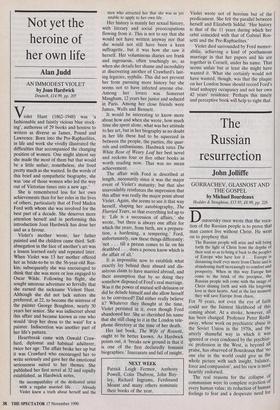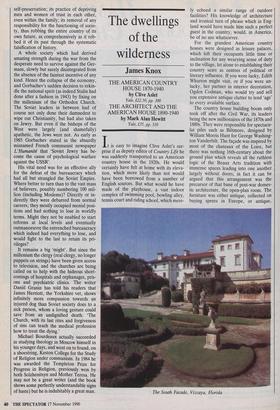The Russian resurrection
John Jolliffe
GORBACHEV, GLASNOST AND THE GOSPEL by Michael Bourdeaux
Hodder & Stoughton, £13.95, £8.99, pp. 226
Dostoevsky once wrote that the voca- tion of the Russian people is to prove that man cannot live without Christ. He went on to prophesy that
The Russian people will arise and will bring forth the light of Christ from the depths of their soul so as to bring it back to the peoples of Europe who have lost it . . . Europe is distancing itself ever more from Christ and is abandoning itself increasingly to comfort and prosperity. When in this way Europe has come to the brink of the precipice, the Russian people will come with the image of Christ shining forth and with His forgiving love in their hearts. And at the last moment they will save Europe from chaos.
For 70 years, not even the eye of faith could see the faintest likelihood of this coming about. At a stroke, however, all has been changed. Professor Peter Redd- away, whose work on psychiatric abuse in the Soviet Union in the 1970s, and the utterly shameful way in which it was ignored or even condoned by the psychiat- ric profession in the West, is beyond all praise, has observed of Bourdeaux that `no one else in the world could give us the whole picture with such insight, balance, force and compassion', and his view is most heartily endorsed. The real reasons for the collapse of communism were its complete rejection of every human value; its reduction of human feelings to fear and a desperate need for self-preservation; its practice of depriving men and women of trust in each other, even within the family; its removal of any responsibility for the functioning of socie- ty, thus robbing the entire country of its own future, as comprehensively as it rob- bed it of its past through the systematic falsification of history.
A whole society which had derived amazing strength during the war from the desperate need to survive against the Ger- mans, slowly but surely disintegrated from the absence of the faintest incentive of any kind. Hence the collapse of the economy, and Gorbachev's sudden decision to rekin- dle the national spirit (as indeed Stalin had done after a fashion in 1943) by fixing on the millenium of the Orthodox Church. The Soviet leaders in between had of course not only done their damnedest to wipe out Christianity, but had also taken on Jewry. But even if the bishops of the West were largely (and shamefully) apathetic, the Jews were not. As early as 1985 Gorbachev stated in the absurdly misnamed French communist newspaper L'Humanite that 'Soviet Jewry has be- come the cause of psychological warfare against the USSR'.
His vital need was for an effective ally for the defeat of the bureaucracy which had all but strangled the Soviet Empire. Where better to turn than to the vast mass of believers, possibly numbering 100 mil- lion (including Moslems)? Directly or in- directly they were debarred from normal careers; they mostly occupied menial posi- tions and had nothing to lose in worldly terms. Might they not be enabled to start reforms at local levels and eventually outmanoeuvre the entrenched bureaucracy which indeed had everything to lose, and would fight to the last to retain its pri- vileges?
It remains a big 'might'. But since the millenium the clergy (real clergy, no longer puppets on strings) have been given access to television, and the churches are being called on to help with the hideous short- comings of hospitals and orphanages, pris- ons and psychiatric clinics. The writer Daniil Granin has told his readers that James Herriott, the Yorkshire vet, shows infinitely more compassion towards an injured dog than Soviet society does to a sick person, whom a loving gesture could save from an undignified death. 'The Church, with its last rites and forgiveness of sins can teach the medical profession how to treat the dying.'
Michael Bourdeaux actually succeeded in studying theology in Moscow himself in his younger days, and went on to found, on a shoestring, Keston College for the Study of Religion under communism. In 1984 he was awarded the Templeton Prize for Progress in Religion, previously won by both Solzhenitsyn and Mother Teresa. He may not be a great writer (and the book shows some perfectly understandable signs of haste) but he is indubitably a great man.
























































 Previous page
Previous page